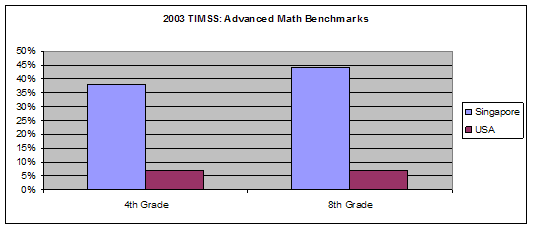
Math Initiative Bill Online
2010 Session
-Sponsor declined to post the bill due to economic circumstances. Good news: some schools are piloting the program anyway.
2009 Session
SB 159 Text
SB 159 Status
Singapore Bar Model Example - Brilliant
Singapore Math example set in Narnia
Full MA Study (Summary / Detail Report)
Longitudinal Study Released-Singapore Math WORKS-early release-Presentation by Dr. Bisk from Massachusetts
Presentation to Utah Legislature Education Committee on 9-17-08 (free download)
Dr. Yeap Ban Har's Singapore Math Powerpoint Presentation in Utah on 6-12-08 (free download)
Singapore Math: Simple or Complex (article)

Agency Based Education
Letter of Recommendations - Summary
We encourage you to read the full letter but present this quick summary for the ADD crowd (pun intended).
Utah’s Math Education Moonshot
The engineers and scientists that have taken us to the stars and improved our quality of life in innumerable ways are now retiring, creating a critical shortage of qualified individuals to replace them. This gives Utah a golden opportunity to create a population of engineers, scientists and highly skilled technical personnel to fill the vacuum. This effort would entice top companies to locate in Utah and utilize our premier workforce. To accomplish this objective we should adopt this mission statement.
Mission Statement: Utah will become the premier state in our country for math education within 10 years by partnering with members of the NASA Advisory Council and the National Mathematics Advisory Panel to create standards and programs such that NASA will look first to Utah for at least 10% of its recruits and Utah is recognized as a top source of skilled scientists and engineers.
Utah’s Plan of Action
1. Curriculum: Singapore math implemented in grades K-8 for a cohesive program through algebra. High school math should provide rigorous college preparation classes.
"We are not teaching math, we are teaching thinking through the medium of math."
--Dr. Yeap Ban Har, Ministry of Education, Singapore

2. Standards: A full rewrite to match Singapore math.
3. Testing: End-of-level tests should reveal basic to advanced subject mastery.
4. Algebra: Eighth grade math should be an authentic algebra course. Those who score at the advanced level on the end-of-level test receive high school credit for Algebra 1.
5. Student Progress: Gifted and motivated students may proceed faster than regular classes.
6. Schedule: Math should be taught daily and total at least 144 hours of instruction and testing time each year.
7. Mathematically knowledgeable classroom teachers:
- Teacher Preparation—better preparation of elementary teachers and a higher level subject matter certification for secondary teachers
- Teacher Leaders—Singapore math trainers and single subject math teachers for 4-6
- Teacher Evaluation—value added analysis for student achievement
- Professional Development—Common curriculum training for Singapore math
“Singapore ranked first in the world in math and third in science, in spite of the fact that the country was ranked next to last for the level of home educational resources available. In other words, Singapore’s impressive academic results seem to have very little to do with an advantageous home environment and a great deal to do with an effective school system structure organized around a solid, rigorous curriculum." --Dr. E.D. Hirsch
"NAEP classifies its problems as “easy,” “medium,” or “hard.” I benchmarked the “hard” 8th grade problems, examining NAEP’s highest level of expectation for 8th grade math. Most of these “hard” 8th grade problems are at the level of Singapore’s grade 5 – or lower."
--Dr. John Hoven, Economist in the Antitrust Division of the U.S. Department of Justice; Co-president of the Gifted and Talented Association of Montgomery County, MD
"My point is simple: There is a chasm of difference in expectations between NAEP and the problems used by world-class mathematics leaders. We expect too little from our children, and by lowering our expectations we lower their incentive to achieve."
--Dr. John Hoven